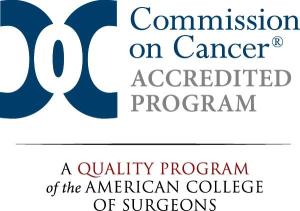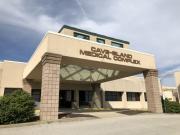Blood Cancer
According to the Leukemia & Lymphoma Society, every three minutes, a person in the United States is diagnosed with blood cancer. These types of cancer affect bone marrow, blood cells, lymph nodes and other parts of the lymphatic system. It can affect the way blood cells form and function, making it harder for the body to fight infection or prevent serious bleeding. There are many different types of blood cancer, and each is treated differently based on where it develops, how fast it grows and other factors. That’s why it’s important to see an experienced specialist.

At Owensboro Health, you have access to board-certified specialists who can diagnose and treat your specific blood cancer, taking into account your unique preferences and treatment goals. Because we’re a Comprehensive Community Cancer Program accredited by the Commission on Cancer of the American College of Surgeons, we offer many of the same treatment options — and advanced technologies — you’d find at an academic medical center, just close to home.
Plus, our multidisciplinary care team is committed to treating you holistically, caring not just for your physical health, but your mental and emotional health, too.
What is Blood Cancer?
Blood cancer is cancer that develops in the blood, most commonly in the bone marrow where blood is produced. This type of cancer affects the way blood cells form and function, making it harder for the body to fight infection or prevent serious bleeding.
Blood Cancer Symptoms
Most symptoms of blood cancer can also be caused by other, less serious conditions. That’s why it’s crucial to consult a doctor to determine if what you’re experiencing is caused by cancer.
Some symptoms of blood cancer include:
- Anemia
- Bone pain or frequent fractions
- Drenching night sweats
- Easy bruising or bleeding
- Enlarged lymph nodes
- Fatigue
- Fever without infection
- Frequent infections
- Itching
- Loss of appetite
- Weight loss
Blood Cancer Risk Factors
A risk factor is something that increases your risk of developing a certain type of cancer. Some risk factors, like those related to genetics, you can’t change. But others, like risk factors related to lifestyle, you can.
Risk factors for blood cancer include:
- Age (risk increases with age)
- Certain genetic conditions
- Exposure to certain chemicals, such as benzene
- Family history
- Gender (blood cancers are typically more common in men)
- Previous treatment with radiation or certain chemotherapy drugs
- Smoking
- Weakened immune system
Blood Cancer Types
There are three main types of blood cancer:
Leukemia
Leukemia is found in the blood and bone marrow. It forms when abnormal white blood cells grow out of control, making it harder for the body to fight infection and disrupting the bone marrow’s ability to produce red blood cells and platelets.
There are several types of leukemia, and they’re grouped by how fast the disease develops and by the type of blood cell involved (myeloid or lymphoid). Some of these types include:
- Acute lymphocytic leukemia (ALL)
- Acute myeloid leukemia (AML)
- Chronic lymphocytic leukemia (CLL)
- Chronic myeloid leukemia (CML)
- Chronic myelomonocytic leukemia (CMML)
Lymphoma
Lymphomas affect the lymphatic system, which removes excess fluid from the body and produces immune cells, called lymphocytes—a type of white blood cell that fights infection. Lymphomas hurt the immune system’s ability to fight infection.
Myeloma
Myeloma develops in the plasma cells, which are the white blood cells that produce disease- and infection-fighting antibodies. By preventing the normal production of antibodies, myeloma weakens the immune system, leaving the body more susceptible to infection.
Diagnosing Blood Cancer
We’ll look at your complete medical history and conduct a physical exam before performing more specific diagnostic procedures to determine if you have blood cancer. This will help us get a full picture of your general and past health and understand any past illnesses and treatments you may have had.
Some of the diagnostic tests for blood cancer we may perform include:
- Blood tests, such as a complete blood count, to check for the number of red blood cells, white blood cells, platelets and amount of hemoglobin in the blood.
- Imaging tests, like X-ray, ultrasound, CT scan, MRI or bone scan.
- Bone marrow biopsy, to check for signs of cancer in the bone marrow, blood and bone.
- Cytogenic analysis, which counts chromosomes in a sample of blood or bone marrow and checks for any changes.
- Flow cytometry, which looks at a cell’s characteristics, such as size, shape and the presence of tumor markers.
- Lumbar puncture, which looks at the spinal fluid for signs of cancer.
- Molecular testing, which checks for certain changes in a gene or chromosome.
Treating Blood Cancer
How we treat blood cancer largely depends on what type of cancer it is, where it develops and how it behaves. For example, chemotherapy is often used to treat leukemia. Chemotherapy may be used in combination with a stem cell transplant to replace the blood-forming cells, which are killed during chemotherapy. Targeted therapy drugs may also be used to identify and attack specific cancer cells.
For Hodgkin lymphoma, we’ll typically recommend chemotherapy, radiation therapy or a combination of the two. If these treatments don’t work, we may recommend immunotherapy. And for multiple myeloma, we may prescribe chemotherapy followed by a stem cell transplant or maintenance therapy to help keep the disease from growing.
We also may recommend supportive therapies, such as radiation therapy to help reduce bone pain in patients with multiple myeloma, to help manage symptoms of the disease or its side effects.
Your Care Team
We will work together to create a personalized treatment plan at the Mitchell Memorial Cancer Center. Your comprehensive team may include the following treating providers and supportive clinicians:
- Medical oncologist
- Hematologist
- Surgical oncologist
- Radiation oncologist
- Genetic counselor
- Oncology counselor
- Social worker
- Nurse navigator
- Dietitian
- Financial advocate
See the full list of provider types and how each role fits into your multidisciplinary team.

















